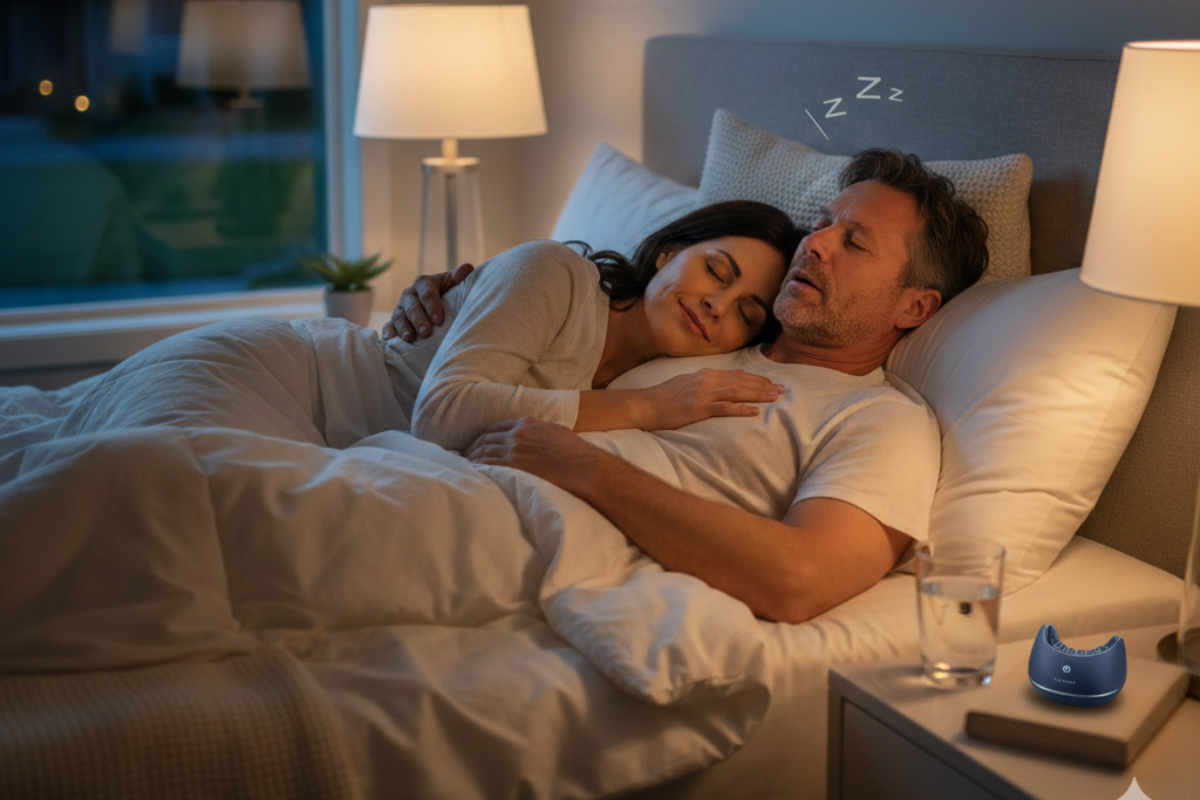Free Shipping - On Orders Over $99 (USA, Canada, UK, & AU)

What Time Should You Go to Sleep?
January 10, 2022 3 min read
How much sleep a person needs depends largely on their age and genetics. Children and teens need more sleep than adults, for example, and some folks can get by on less sleep than the rest of us. Sleep needs can also vary depending on health and lifestyle.
The reason this is important is because it is your individual sleep needs that dictate at which hour you should go to sleep to optimize health. If you need help determining your “ideal” bedtime to meet these needs, consider the following facts when setting up your sleep schedule.
Sleep and Your Circadian Rhythm
Your sleep-wake cycle is regulated by your circadian rhythm, essentially your body’s pacemaker. But the circadian rhythm also responds to environmental cues, such as light and darkness, to cause physical changes that make you feel sleepy.
Your circadian rhythm follows a predictable 24-hour cycle. When the sun rises, light stimulates your brain to reduce melatonin production. Melatonin is a hormone that makes you feel sleepy. As the day goes on, pressure to sleep builds up and becomes hard to resist in the evening with sunset and darkness.
Most people align their sleep schedule with these natural rhythms. But for some, work and family obligations can make it difficult to follow their body’s cues.
The Recommended Amount of Sleep
According to recommendations by the National Sleep Foundation, the recommended amount of sleep for each age group is:
Babies: 12-17 hours
Toddlers: 11-14 hours
Preschoolers: 10-13 hours
School-age children: 9-11 hours
Teens: 8-10 hours
Adults: 7-9 hours
Older adults: 7-8 hours
These recommendations are for relatively healthy persons not suffering from a sleep disorder. Those with health conditions usually require more sleep at times. Otherwise, people rarely need more or less sleep than recommended here.
Besides meeting your recommended amount of sleep, the American Sleep Association says that maintaining a regular sleep routine is just as important for quality sleep.
Ideal Bedtime Based on Your Sleep Needs
The ideal bedtime for most healthy adults is in the late evening, i.e. between 9 and 12 pm. That’s when the pressure to sleep naturally builds up. Going to bed at this time allows most people to meet their recommended 7 to 9 hours of sleep if they need to be awake by 7 am.
You can determine what time is best for your individual sleep schedule by calculating how many hours of sleep you would get by going to bed at a certain hour. Say you need to wake up at 6 am and you feel refreshed after 8 hours of sleep. That would set your ideal bedtime at around 10 pm.
However, keep in mind that it takes a couple of minutes for most people to wind down and gradually fall asleep. This is known as sleep onset latency. Normal sleep onset latency is between 10 and 20 minutes. Take this additional “wind-down” time into account when setting your ideal bedtime.
Improving Your Bedtime Routine
You’ve set your ideal bedtime, but that’s just the first step to getting quality sleep. The next is to develop a good bedtime routine. Follow these tips when it’s your time to go to sleep:
- Take a short walk or exercise in the late afternoon
- Avoid heavy meals in the evening
- Dim the lights and set the thermostat to 60 to 67 degrees
- Avoid mentally stimulating activities and practice relaxation techniques
- Use earplugs if you leave in a noisy environment
- Use a tongue-stabilizing device if you’re a snorer
And if you find that you can’t fall asleep 30 minutes after going to bed, get up and try to distract yourself with activities you enjoy. The more you think about your struggle to fall asleep, the more pressure you are putting on yourself, which can be counterproductive.
References:
Beersma DG, Gordijn MC. Circadian control of the sleep-wake cycle. Physiol Behav. 2007;90(2-3):190-195. doi:10.1016/j.physbeh.2006.09.010
Hirshkowitz M, Whiton K, Albert SM, et al. National Sleep Foundation's sleep time duration recommendations: methodology and results summary. Sleep Health. 2015;1(1):40-43. doi:10.1016/j.sleh.2014.12.010
Sleep Hygiene Tips. American Sleep Association. Accessed December 2020. https://www.sleepassociation.org/about-sleep/sleep-hygiene-tips/
Kushida CA, editor. Encyclopedia of sleep. Oxford (United Kingdom): Elsevier; 2013. p. 96-99
https://www.sciencedirect.com/referencework/9780123786111/encyclopedia-of-sleep
Also in Blog

Healthy Sleep Goals For 2026
December 22, 2025 6 min read

💨 Are Your Nighttime Breathing Issues Robbing You of Your Health and Your Energy?
December 12, 2025 3 min read
Breathing issues during sleep, collectively known as sleep-disordered breathing, are a major public health concern.

Is Your Snoring a Sign of Something More Serious? Unpacking the Science of Sleep
December 05, 2025 3 min read
When you snore, what's actually happening?
Join our Insiders Club
Every week you will receive specials, discounts, and giveaways.
Categories
- Better Sleep
- depression
- Fitness
- funny animal
- Global Citizenship
- health
- Mental Health
- mouthpiece
- nutrition
- pillow
- Productivity
- relationships
- sleep
- sleep apnea
- sleep deprivation
- Sleep Tech
- snoring
- snoring humor
- snoring jokes
- snoring sounds
- stop snoring
- StopSnoringStartLiving
- technology
- Tongue displacement
- travel
- video
- Young Adult

